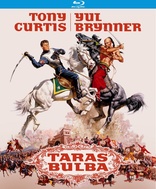Taras Bulba Blu-ray Movie
HomeTaras Bulba Blu-ray Movie 
Kino Lorber | 1962 | 122 min | Rated PG | Sep 23, 2014Movie rating
6.4 | / 10 |
Blu-ray rating
| Users | 0.0 | |
| Reviewer | 3.0 | |
| Overall | 3.0 |
Overview
Taras Bulba (1962)
A spectacular tale of conflict and passion in a savage era!
Starring: Tony Curtis, Yul Brynner, Sam Wanamaker, Brad Dexter, Guy RolfeDirector: J. Lee Thompson
| History | Uncertain |
| Drama | Uncertain |
| Adventure | Uncertain |
| Action | Uncertain |
Specifications
Video
Video codec: MPEG-4 AVC
Video resolution: 1080p
Aspect ratio: 2.34:1
Original aspect ratio: 2.35:1
Audio
English: DTS-HD Master Audio 2.0 (48kHz, 16-bit)
Subtitles
English
Discs
25GB Blu-ray Disc
Single disc (1 BD)
Playback
Region A (B, C untested)
Review
Rating summary
| Movie | 3.0 | |
| Video | 3.5 | |
| Audio | 4.0 | |
| Extras | 0.5 | |
| Overall | 3.0 |
Taras Bulba Blu-ray Movie Review
Hat trick.
Reviewed by Jeffrey Kauffman September 25, 20141962 should have been a foolproof year for an historical epic, even if the “history” was somewhat fanciful and highly fictionalized. After all, the previous several years had seen a glut of big budget, all star affairs that broke box office records, films as diverse as The Ten Commandments, Ben-Hur, King of Kings and El Cid, the last two of which debuted the previous year in 1961. And in fact 1962 gave birth to the film that many still consider the paradigm of the historical epic, David Lean’s iconic Lawrence of Arabia. And yet something went at least a bit haywire with 1962’s Taras Bulba, a sprawling J. Lee Thompson film (produced by Harold Hecht, who took an above the title billing for his trouble) based upon a Nikolai Gogol story that had been filmed several times previously. Perhaps because the story had fictional elements to begin with, elements that scenarists Waldo Salt and Karl Tunberg, further played with, Taras Bulba didn’t seem to have the immediacy of some of its cinematic predecessors. Perhaps the setting—the steppes of the Ukraine, then under Polish control—was simply too distant to generate much audience interest. Perhaps the uneasy mixture of “noble savage” Cossacks and martinet Polish religious and military authorities failed to strike a chord in contemporary viewers. All of these probably contributed to Taras Bulba’s failure at the box office, but I’d like to suggest another, more immediate, reason: hats. Yes, hats. As in headwear. Taras Bulba features some of the silliest hats in film, “fashion accessories” so absurd at times that it’s hard not to giggle when, for example, star Yul Brynner (as the titular Taras Bulba) is intoning portentous dialogue while sporting what appears to be a discarded pair of women’s underwear adorning his bald pate. This is of course posited (mostly) in jest, but there is a resolutely wacky side to Taras Bulba that was no doubt unintended. The basic story elements are here for a rousing historical romance, with Tony Curtis (as Taras’ son Andrei) and Curtis’ then wife Christine Kaufmann as star-crossed lovers caught in a Romeo and Juliet scenario as Brynner’s Taras fights to reclaim the Cossack steppes from the invading Poles. But with a number of ill conceived elements, including some laughable rear projection, weirdly sped up horse riding sequences, and only transitory emotional impact, Taras Bulba is an epic which (to coin a phrase and evoke an image from the film itself) fails to jump the chasm, jumping a figurative shark instead.
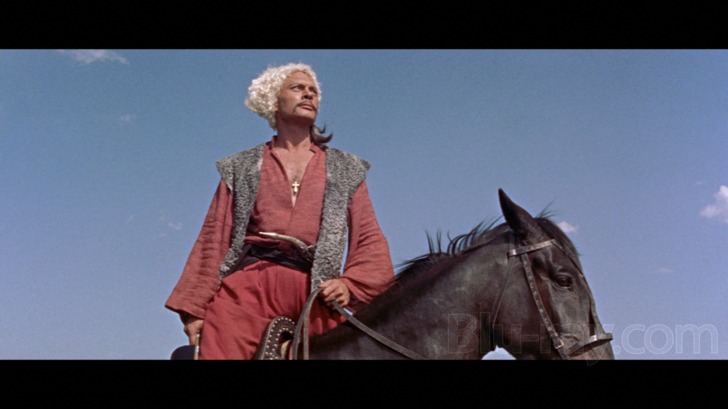
On a vast plain somewhere in Eastern Europe (actually Argentina doing a fairly passable “impersonation”), a huge Polish army awaits the arrival of their allies the Cossacks in order to take on a Turkish battalion. The Cossacks are late to the battle, causing concern for a Polish underling. But the Polish commander assures his junior officer the Cossacks will soon be there, and sure enough, a huge horde of the natives suddenly comes charging over the hill. Director Thompson gives Brynner an almost Sergei Eisensteinian close-up, all askew within the frame and with the camera pointing up toward the sky to help magnify the character’s importance, as Taras Bulba calls his cavalry to arms. While the Cossacks quickly rout the Turks, they find that it was all basically a ruse—the Poles wanted these scrappy natives to do their dirty work for them, at which point they surround and attack the Cossacks themselves, revealing that Poland now considers the steppes Polish territory, and that the Cossack armies must be dispersed.
Taras and the rest of the Cossack brotherhood retreat in apparent defeat, chopping off their distinctive “skull lock” hairstyles so that they can’t be identified, supposedly disappearing into the surrounding countryside to wait for however long it takes to wreak their vengeance upon the Poles. In the ensuing years, Taras and his wife have two boys, Andrei (played by Tony Curtis as an adult) and Ostap (Perry Lopez). The film offers some brief glimpses of “home” life at the Bulbas, with Taras engaging in playful wrestling with Andrei, wrestling which typically ends with Andrei getting dumped in a nearby vat of water. But Taras has been plotting all along, and when a Kiev academy opens its doors to Cossacks, Taras sends his boys there with directions to learn as much about the Poles as possible.
While in Kiev, Andrei spies the gorgeous daughter of the local Polish governor, a winsome lass named Natalia Dubrov (Christine Kaufmann). Natalia is flirtatious, but distant, but ultimately Andrei wins her over, though that invites the scorn of her brother, who decides to teach the “heathen” Cossack brothers a lesson one night. That puts a halt to any burgeoning romance while sending the brothers scampering back to the steppes. In the meantime, the Poles are once again asking for the Cossacks’ help in containing the Turkish forces, but Andrei is not inclined to work for his former tormentors, leading to one of the film’s big set pieces, a thrilling test of nerves as Andrei and a competitor repeatedly jump their horses over a looming chasm to determine bravery and, ultimately, whom God wishes to survive (hint: it’s Andrei).
Taras Bulba has a number of other odd elements (besides its hats, that is). The film is almost a quasi-musical at times, with a couple of frankly kind of bizarre song and dance numbers, including a folk tune warbled by Yul Brynner in his best, imperious KIng of Siam mode. And there are a number of almost slapstick comedy snippets thrown in to boot, something that is distinctly at odds with the more expected heavy Russian tragic sensibility that infuses most of the film. That sensibility manages to finally work up a reasonable amount of emotional impact once the Cossacks under Taras' leadership take on the Poles, while Andrei attempts to subvert their progress in order to save his true love.
Speaking of music, the one undeniable saving grace of Taras Bulba is its wonderful score by Franz Waxman, who received an Academy Award nomination for his trouble. A gorgeous love ballad called "The Wishing Star" (which failed to make the cut for Best Song that year) is interwoven into many scenes, along with actual ethnic folktunes and Waxman's typically frenetic string writing. Unfortunately, a lot of the rest of Taras Bulba is about as flat as the vaunted steppes on which is supposedly takes place.
Taras Bulba Blu-ray Movie, Video Quality 
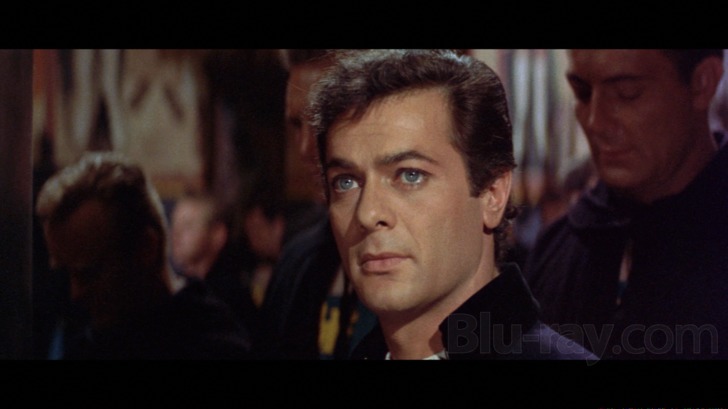
Taras Bulba is presented on Blu-ray courtesy of Kino Lorber Studio Classics with an AVC encoded 1080p transfer in 2.34:1. Elements here are in very good shape for the most part, with typical age related issues cropping up now and again, including things like blemishes, scratches and minus density. The grain field looks untouched, but is still rather variable given the prevalence of opticals scattered throughout the film. There's some frankly surprisingly shoddy matte and rear projection work in this film that the Blu-ray's resolution tends to make even worse (see screenshots 7 and especially 17 for two examples). Color is quite nicely saturated, but like the grain suffers from varying registration issues throughout the film. At times, reds ring true and flesh tones are ruddy and natural looking, but at other times things can vary from flesh tones looking pallid to veering toward the brown end of things, while hues like reds tend to assume a more orange-brown tone. The exterior footage is often quite dramatic and provides ample depth of field. There are no signs of any problematic digital intrusion on the image.
Taras Bulba Blu-ray Movie, Audio Quality 
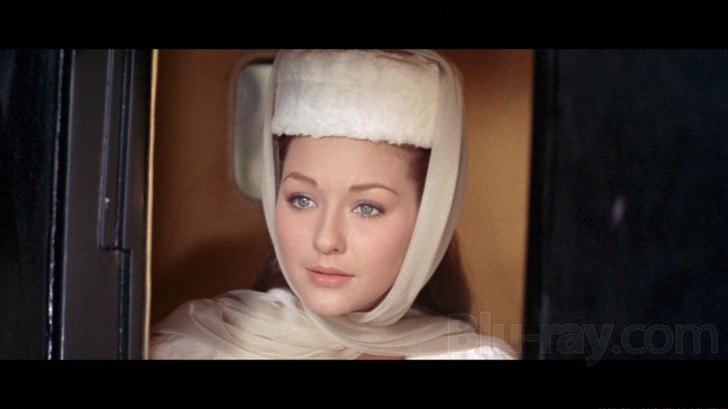
Taras Bulba's lossless DTS-HD Master Audio 2.0 mono tracks very capably supports everything from the film's dialogue to the sometimes busy foley effects (especially in the battle sequences) to Franz Waxman's epic score. Prioritization is very good to excellent, and the track has no problematic drop outs, overly intrusive hiss or other major problems. Fidelity is excellent and dynamic range is quite wide.
Taras Bulba Blu-ray Movie, Special Features and Extras 
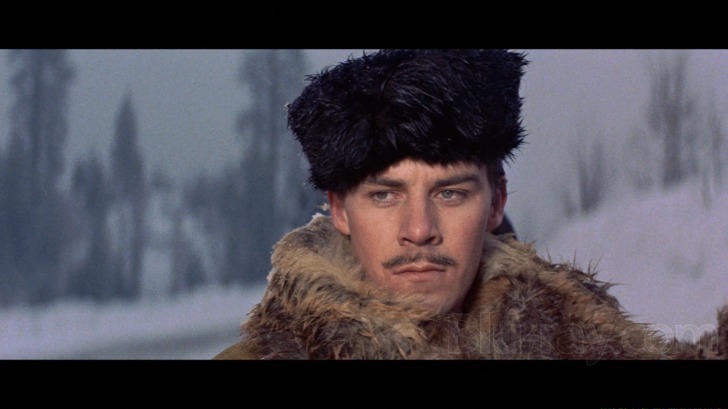
- Trailer (1080p; 3:35)
Taras Bulba Blu-ray Movie, Overall Score and Recommendation 
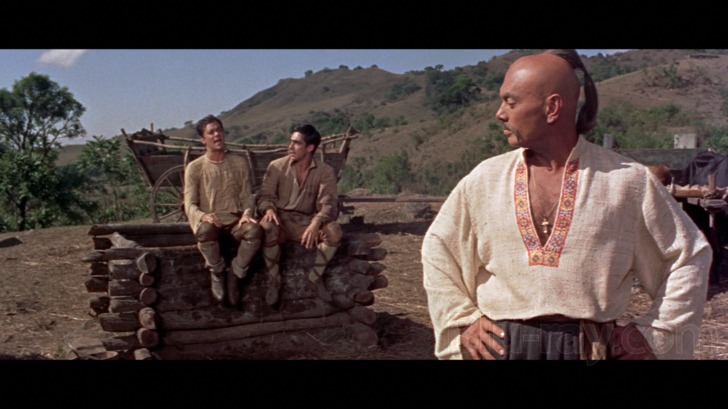
Taras Bulba simply doesn't have the gravitas an epic film of this ilk typically offers, and in fact its own bizarre comedic moments completely undercut what is one of the film's strongest aspects, its kind of dour, fatalistic (and very Russian) ambience. Brynner and Curtis are fine, and Kaufmann is beautiful, but the film rarely engages the emotions and simply plays out as a very colorful pageant most of the time. Waxman's music is an earful, though, and helps to elevate the film above its more pedestrian tendencies. While no underappreciated classic, Taras Bulba is big, noisy and quite boisterous. Despite its manifest flaws, Taras Bulba comes Recommended.
Similar titles
Similar titles you might also like

The War Lord
1965

The Vikings
1958

Ivanhoe
Warner Archive Collection
1952

Knightfall: Season One
2017

Flesh+Blood
Standard Edition | Flesh and Blood
1985

The Crusades
1935

Kidnapped
1971

Flame Over India
North West Frontier
1959

Robin of Sherwood: Set 1
Seasons 1 & 2 / Robin Hood
1984

The Long Ships
1964

Intolerance
Intolerance / The Mother and the Law / The Fall of Babylon
1916

Helen of Troy
Warner Archive Collection
1956

Hammer of the Gods
2013

Against All Flags
1952

Captain from Castile
Limited Edition to 3000
1947

The Barbarian and the Geisha
1958

Prince of Foxes
1949

The Last King
Birkebeinerne
2016

Texas Rising
2015

Blood Alley
Warner Archive Collection
1955
